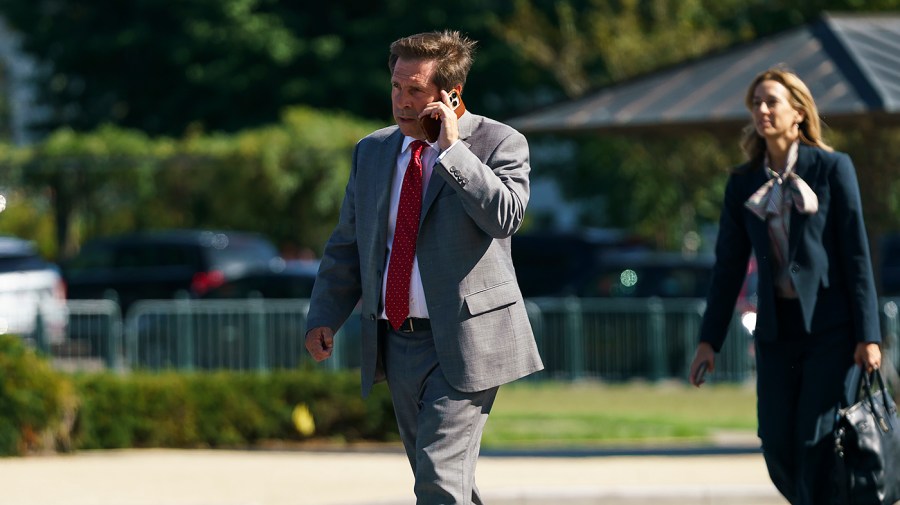The messy government shutdown fight this month foreshadows some of the challenges House Republicans could face next year, as a major test on funding awaits the incoming GOP “trifecta.”
Congress narrowly averted a government shutdown last week — but not without a bit of drama. GOP leadership struggled to meet tough demands from President-elect Trump, while navigating a tight Republican majority to produce a deal that could also pass the Democratic-led Senate in the eleventh hour.
Lawmakers ultimately voted to keep the government’s lights on through mid-March.
But some see the fight as a kind of practice run by Republicans for when they are expected to ramp up work on the 12 fiscal 2025 funding bills early next year.
“The reality, for the better part of the first year, [is] we’re going to have a one-vote majority,” Rep. Chuck Fleischmann (R-Tenn.), a spending cardinal, said earlier this month. “So, in a way, it’s almost like practice, showing what we’re going to have to do.”
“On the upside, we know we’re going to have to sit in rooms and communicate and listen and work through some things,” he said. “Probably not going to be all easy times. Some will be. But I think it was a good trial run for 2025.”
House GOP leadership has already seen challenges in wrangling the various factions of its party to pass funding bills with a razor-thin majority in the lower chamber.
Leaders previously aimed to have all 12 annual funding bills passed by the August recess. But those hopes were deflated over the summer as internal divides over issues such as abortion reemerged.
“When you have a situation where the Democrats all vote no on every appropriations bill, you eventually hit a wall because, you know, we have a few of our own members that vote against some of these bills,” House Majority Leader Steve Scalise (R-La.) said at the time, while also calling on the Senate “to start doing their work.”
The Senate has yet to pass any of its annual funding bills for fiscal 2025, while the House passed about half of its 12 full-year spending plans. However, the House bills are much more partisan in nature than the bipartisan proposals crafted in the currently Democratic-led Senate, where a 60-vote threshold is required for most legislation.
That means House Republicans could only afford a few defections to pass their annual funding plans, with most or all Democrats voting in opposition. And that margin is only getting smaller in the next Congress, when the GOP-led Senate will have a larger majority than in the House for the first time in about six decades.
Under the legislation passed to avert a shutdown last week, Congress set its new deadline of March 14 to hash out funding for the remainder of fiscal 2025 — and top appropriators on both sides say the roughly three-month time frame is realistic to complete their annual funding work.
“All our bills are out of committee. We know where we’re at on all the issues. So, we just need to sit down and work with our colleagues,” House Appropriations Committee Chair Tom Cole (R-Okla.) said, noting his working relationship with Senate Appropriations Committee Chair Patty Murray (D-Wash.); Sen. Susan Collins (R-Maine), the top Republican on the panel; and Rep. Rosa DeLauro (Conn.), the top Democratic appropriator in the House.
“Let the appropriators do their job. I promise you, we’ll get our bills done on time,” Cole said.
Despite having control of both chambers, the more partisan bills staking out the House GOP’s starting position are still expected to look different from the final, conferenced product with the Senate, where Democratic votes will be needed for final passage.
“They’ll be hard to negotiate out,” Rep. Mike Simpson (R-Idaho), another spending cardinal, said when asked about the funding work ahead. But he also brushed off concerns about the threat of across-the-board cuts after April if Congress doesn’t pass its fiscal 2025 funding bills by then.
He added he knows appropriators will be able to finish the bills “on time” once leadership signs off on a top-line agreement that will allow negotiators to begin crafting the compromise bills between both chambers.
But Trump earlier this month sunk an agreement for a continuing resolution that had been worked out between both chambers, sending lawmakers scrambling.
And some Republicans have already shared concerns about the delayed funding work cutting into much-needed time for other priorities, particularly as leaders eye passing two budget reconciliation packages to tackle parts of Trump’s agenda on border, energy and taxes next year.
Rep. Mark Amodei (R-Nev.), head of the funding subcommittee that crafts funding bills for the Department of Homeland Security, described next year’s balancing act as “the multitasking Olympics.”
“Pre-15th of March, you still got to finish. You’ve got to finish ‘25 so reconciliation is going to be a piece of that on how you finish ‘25,” Amodei told The Hill, while also saying reconciliation work could have an impact on Congress’s annual funding work.
“It’ll be multitasking time because you got to be working on that, at the same time you’re finishing up ‘25, and at the same time you’re starting hearings on ‘26, which is the first full year of a Trump administration,” he added.

